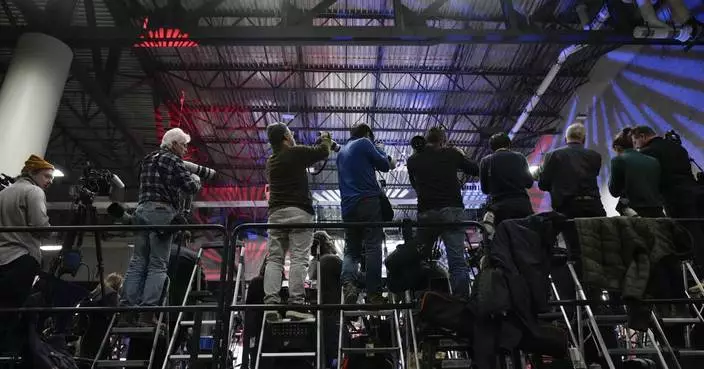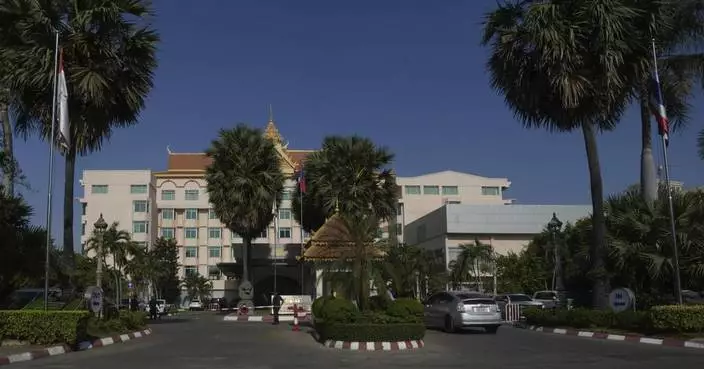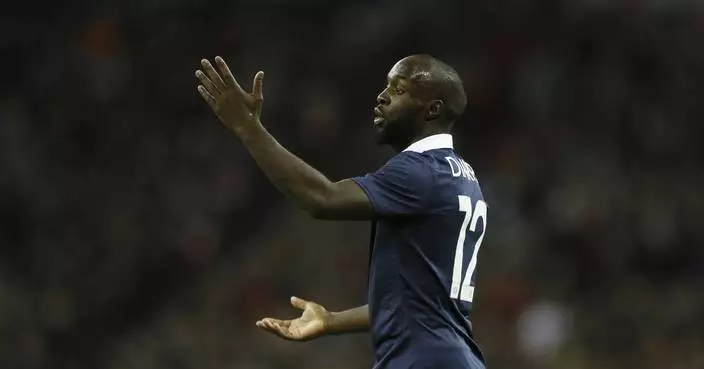NATO ally Turkey is being kicked out of the U.S.-led F-35 fighter jet program over its decision to buy the Russian-made S-400 air defense system.
The White House said Turkey's decision to buy the Russian system "renders its continued involvement with the F-35 impossible" while the Pentagon suspended Turkey from the program and said it will be removed as a partner in making the planes.
Here is a look at the rift between the NATO allies over the deal.
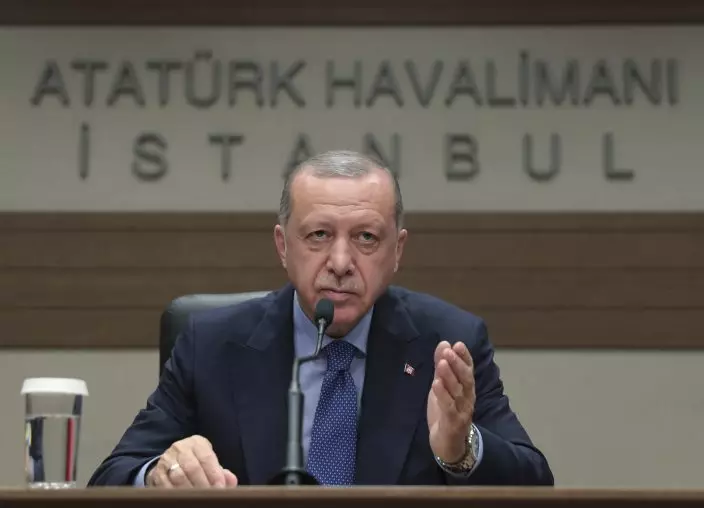
Turkey's President Recep Tayyip Erdogan speaks to reporters before leaving for Bosnia, in Istanbul, Monday, July 8, 2019. Erdogan says Russia's S-400 air defense missiles are currently being prepared to be flown to Turkey. Erdogan would not however say when the Russian missile defense system would reach Turkey or where they will be deployed.(Presidential Press Service via AP, Pool)
WHAT ARE S-400s?
The Russian-made S-400 Triumph is a sophisticated long-range surface-to-air missile defense system capable of striking enemy aircraft and cruise missiles. It has a range of 400 kilometers (250 miles). The system can simultaneously engage multiple targets and is capable of shooting down ballistic missile warheads along with aircraft and cruise missiles.
Turkey reached a deal with Russia for the purchase of two batteries at a reported cost of $2.5 billion in December 2017. Erdogan has said the systems will both be operational by April 2020. Officials have refused to disclose where the systems will be deployed.
WHY IS NATO-MEMBER TURKEY BUYING THE RUSSIAN SYSTEM?
Turkey, which neighbors trouble spots such as Syria, Iraq and Iran, has long sought to address shortcomings concerning its air defenses. It says it was forced to negotiate with Russia for the purchase of the S-400s after the U.S. refused to sell the American-made Patriot system. Turkey has also argued that the S-400 is one of the best available systems and says the deal with Russia involves joint production and technology transfers which meet its long-term goals of defense self-sufficiency.
The United States says talks on a potential Patriot deal failed over Turkey's insistence on technology transfer rights that would have allowed it eventually to make the missiles themselves. This ran against U.S. manufacturer's propriety interests in addition to any national security concerns.
Turkey's rapprochement with Russia and its decision to buy the Russian system also coincides with growing Turkish mistrust of the U.S. over its policies in Syria. More specifically, Turkey has been angered with U.S. support for a Syrian Kurdish group in Syria that is affiliated with Kurdish rebels fighting Turkey.
Turkey also distrusts Washington because Muslim cleric Fethullah Gulen, whom Ankara says orchestrated a 2016 failed coup, remains free in the U.S. Gulen denies involvement in the coup attempt.
WHY DOES THE US OBJECT TO TURKEY'S S-400 PURCHASE?
The U.S. says the S-400s can't be integrated into the NATO system and pose a threat to the F-35 fighter jet program. Washington is concerned that system could be used to gather data on the capabilities of the F-35, and that the sensitive information could end up in Russian hands.
Turkey insists the U.S. fighter jets won't be compromised because the S-400 and F-35s will be deployed in separate locations and the S-400 will be under Turkish control. Turkey has also proposed the setting up of a joint working group to study how the S-400 system would interact with the fighter jets.
WHAT DOES TURKEY'S SUSPENSION FROM THE F-35 PROGRAM MEAN?
Pentagon's chief weapons buyer, Ellen Lord, told a news conference that the U.S. has suspended Turkey from the F-35 program and is beginning the process of its formal removal. The process of removing Turkey permanently is underway and should be completed by March 31, she said.
Lord said Turkey, which makes more than 900 components of the stealth aircraft, stands to lose $9 billion in future earnings as its parts supplier.
Washington has already suspended a program of F-35 flight training for Turkish student pilots and instructor pilots at Luke Air Force Base in Arizona and given those personnel a July 31 deadline to leave the U.S.
Separately, the U.S. has also warned that Turkey could face economic sanctions under the Countering America's Adversaries Through Sanctions Act (CAATSA). Previous U.S. sanctions on Turkey over its detention of an American pastor had caused a slide in the Turkish lira.
However, President Donald Trump, who has struck cordial relations with Erdogan, has taken a more conciliatory approach to Turkey, raising hopes in the country that it will avert harsh penalties. The U.S. State Department this week has been silent on whether those sanctions will be imposed.
Turkey says it is prepared for U.S. sanctions and can impose countermeasures of its own. Some media reports have said Turkey could launch an operation into northeast Syria in reaction to the U.S. sanctions.
HOW DOES THE DEAL AFFECT NATO?
Turkey has been a key member of the NATO alliance since it joined in 1952. It has the second-largest army in NATO after the U.S. and has been protecting the alliance's southeastern flank for years.
It is unprecedented for a NATO ally to purchase such advanced defense weaponry from Russia, which is considered to be NATO's main adversary. Turkey's deal with Russia has raised questions over whether the country is moving under Russia's influence and over its future membership.
However, NATO Secretary General Jens Stoltenberg has said Turkey's contributions to NATO and the alliance's cooperation with Ankara "is much broader" than the F-35 issue. He said: "I'm not underestimating the difficulty related to (the) S-400, but I'm saying that Turkey, as a NATO member, is much more than S-400."
Turkish Defense Minister Hulusi Akar has said the purchase "was not an option but rather a necessity" because of Turkey's security concerns. He stressed that there was no change in Turkey's "strategic orientation."
BEIRUT (AP) — The European Union announced Thursday an aid package for Lebanon of 1 billion euros — about $1.06 billion — much of which will go to boost border control to halt the flow of asylum seekers and migrants from the small, crisis-wracked country across the Mediterranean Sea to Cyprus and Italy.
The deal follows other EU aid packages for countries such as Egypt, Tunisia and Mauritania to fortify their borders. It comes against a backdrop of increasing hostility toward Syrian refugees in Lebanon and a major surge in irregular migration of Syrian refugees from Lebanon to Cyprus.
European Union Commission President Ursula von der Leyen said during a Beirut visit with Cypriot President Nikos Christodoulides that the aid distribution will start this year and last till 2027.
The bulk of the aid — 736 million euros — would go to support Syrian refugees “and other vulnerable groups” in Lebanon, while 200 million euros are meant to bolster Lebanese security services in enforcing border and migration control, according to figures provided by the Cypriot government.
An unspecified amount would go to Lebanese fishermen, to discourage them from selling their boats to smugglers.
Von der Leyen said the EU will also work on a “more structured approach to voluntary return" of Syrian refugees "in close cooperation with” the U.N. refugee agency. The bloc will continue to maintain “legal pathways” for resettlement of refugees in Europe, she said.
Lebanon's caretaker Prime Minister Najib Mikati praised the package, saying that “Lebanon’s security is security for European countries and vice versa,” and that an escalation of the crisis ”will not be limited to Lebanon but will extend to Europe."
Lebanon, which has been in the throes of a severe financial crisis since 2019, hosts nearly 780,000 registered Syrian refugees and hundreds of thousands more who are unregistered, the world's highest refugee population per capita.
Lebanese political officials have for years urged the international community to resettle the refugees in other countries or assist their return to Syria — voluntarily or not. Lebanese security forces have stepped up deportations of Syrians over the past year.
Tensions further flared after an official with the Christian nationalist Lebanese Forces party, Pascal Suleiman, was killed last month in what military officials said was a botched carjacking by a Syrian gang. The incident prompted outbreaks of anti-Syrian violence by vigilante groups.
Meanwhile, Cypriot authorities complain the island nation has been overwhelmed by irregular migration of Syrian asylum seekers, many of them coming on boats from Lebanon.
The UNHCR in Lebanon said it had verified 59 “actual or attempted” departures by boats carrying a total of 3,191 passengers from Lebanon between January and mid-April, compared to three documented boat movements carrying 54 passengers in the same period last year. Usually, few boats attempt the much more dangerous crossing in the winter. In all of 2023, UNHCR recorded 65 boat departures carrying 3,927 passengers.
Cyprus has taken a new approach to halting the flow of migrants. Last month, it suspended processing of Syrian asylum applications, and human rights groups accused the Cypriot coast guard of forcibly turning back five boats carrying about 500 asylum seekers coming from Lebanon. Cypriot officials have denied this.
Bassel al-Shayoukh, a Syrian refugee from Idlib living in Lebanon since 2014, said his brother and several cousins and nephews were on one of the boats turned back. Now he wants to make the journey himself.
“In the beginning I thought that in a year or two the war would be over in Syria,” he said, but it dragged on, while in Lebanon “every year ... the situation began to get worse.”
Shayoukh said he fears being beaten by vigilantes or deported to Syria after Lebanese authorities declined to renew his residency permit.
His 17-year-old nephew, who declined to give his name fearing for his safety, said the Cypriot coast guard started making waves to push the boat he was on away. “I was terrified... I don’t know how to swim,” he said. “I thought we were going to die.”
The people on the boats “stayed three days without food or water” before turning back to Lebanon, the teen added.
Back in Lebanon, they were detained by the army; those registered with UNHCR were released and the others deported.
Mohammed Sablouh, a Lebanese human rights lawyer who works on refugee and migrant cases, says Lebanese authorities are deliberately “turning a blind eye" to the surge in migration to "pressure the international community.”
The Lebanese army did not respond to a request for comment on their measures to combat smuggling.
Thursday's aid announcement comes ahead of the annual fundraising conference for the Syrian crisis in Brussels later this month. After 13 years of civil war, donor fatigue has set in while the world’s attention is occupied by the humanitarian fallout of more recent conflicts in Ukraine and Gaza.
The Cypriot president said Thursday was a “historic day” and called for European officials to go farther and declare some areas of Syria safe for return.
“The current situation is not sustainable for Lebanon. It is not sustainable for Cyprus, it is not sustainable for the European Union,” Christodoulides said.
But not all Lebanese officials are convinced the European aid would solve the problem.
Lebanese Forces party head Samir Geagea told The Associated Press earlier this week that European authorities are mainly concerned “that the refugees don’t go to Europe."
"For us the problem is that we cannot have our country drowning in illegal Syrian refugees,” Geagea said, urging for Syrians to be sent back to either government or opposition-held areas of the neighboring country.
But Shayoukh says he has nowhere to go.
The Damascus government wants him for opposing Syrian President Bashar Assad, he said, while the Islamist group that now controls his hometown behaves "the same way as the regime’s intelligence services” in crushing dissidents.
Associated Press writer Menelaos Hadjicostis in Nicosia, Cyprus, contributed to this report.
Follow AP’s global migration coverage at: https://apnews.com/hub/migration

Lebanese caretaker Prime Minister Najib Mikati, center, speaks during his meeting with Cyprus' President Nikos Christodoulides, left, and President of the European Commission Ursula von der Leyen at the government palace in Beirut, Lebanon, Thursday, May 2, 2024. (AP Photo/Hassan Ammar)
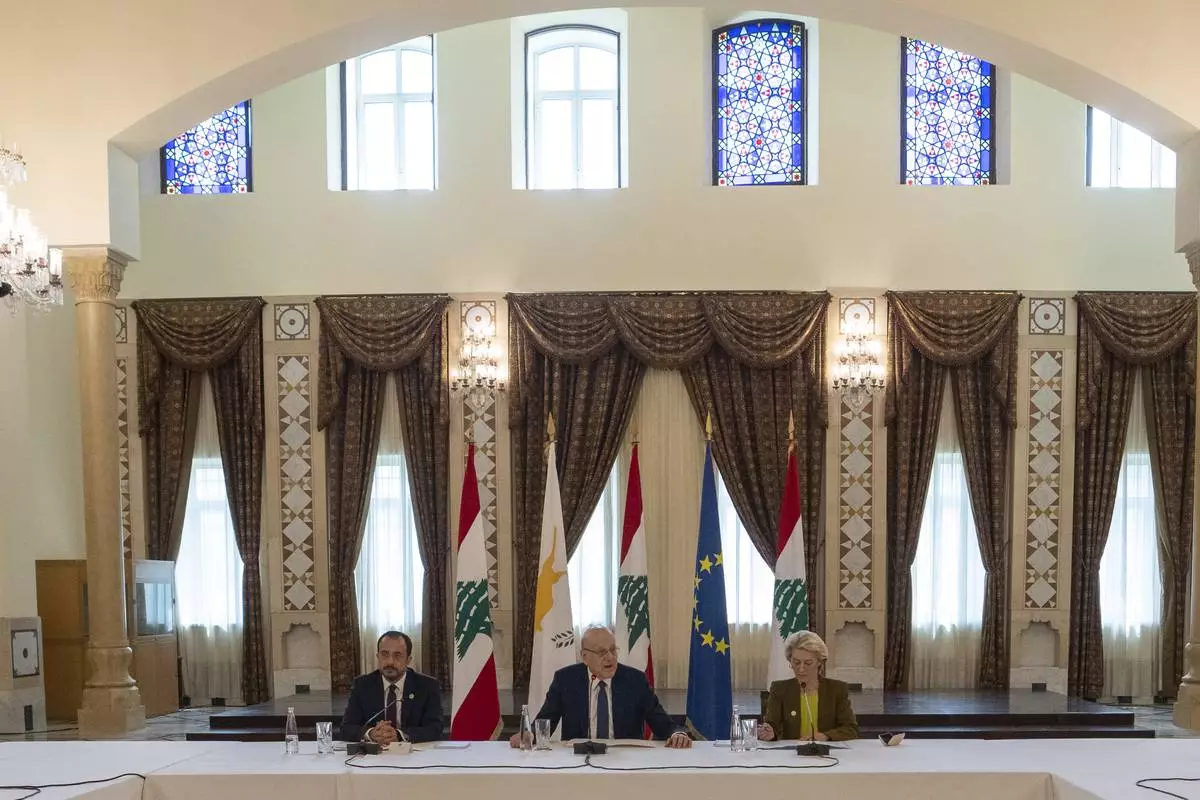
Lebanese caretaker Prime Minister Najib Mikati, center, speaks during his meeting with Cyprus' President Nikos Christodoulides, left, and President of the European Commission Ursula von der Leyen at the government palace in Beirut, Lebanon, Thursday, May 2, 2024. (AP Photo/Hassan Ammar)
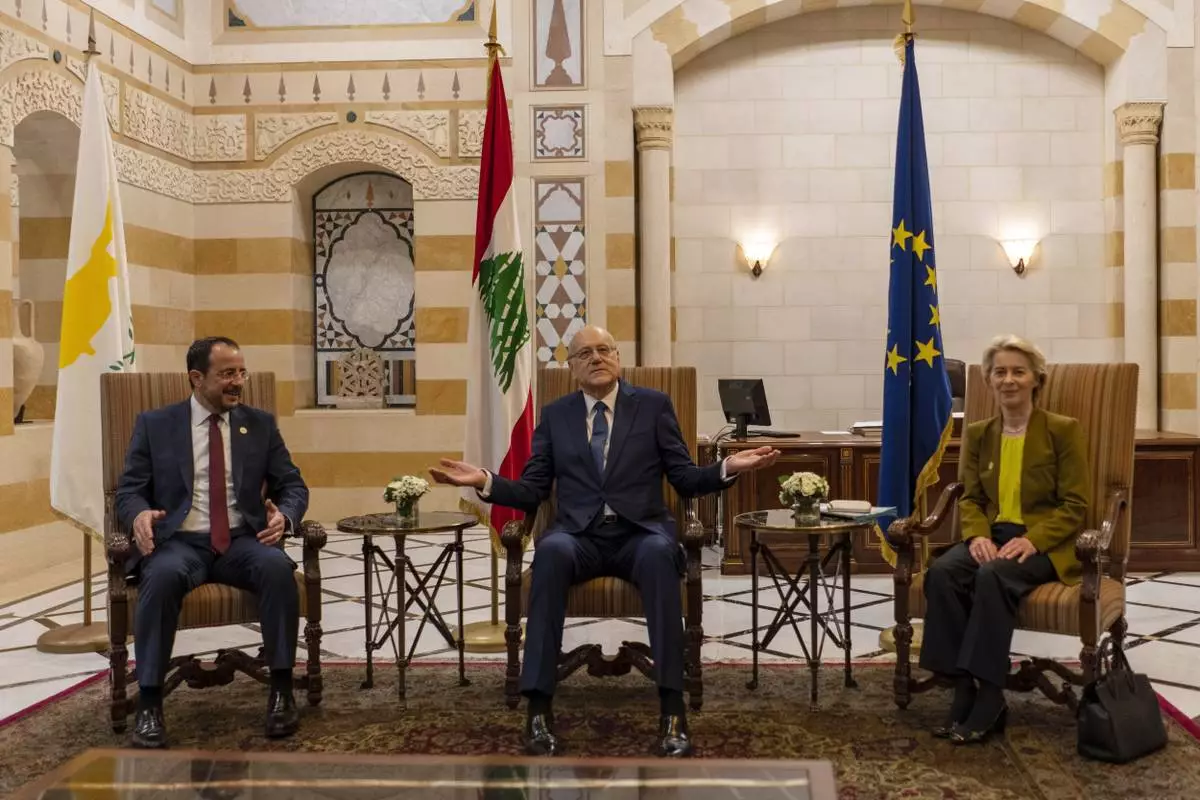
Lebanese caretaker Prime Minister Najib Mikati, center, welcomes Cyprus' president Nikos Christodoulides, left, and President of the European Commission Ursula von der Leyen before their meeting at the government palace in Beirut, Lebanon, Thursday, May 2, 2024. (AP Photo/Hassan Ammar)
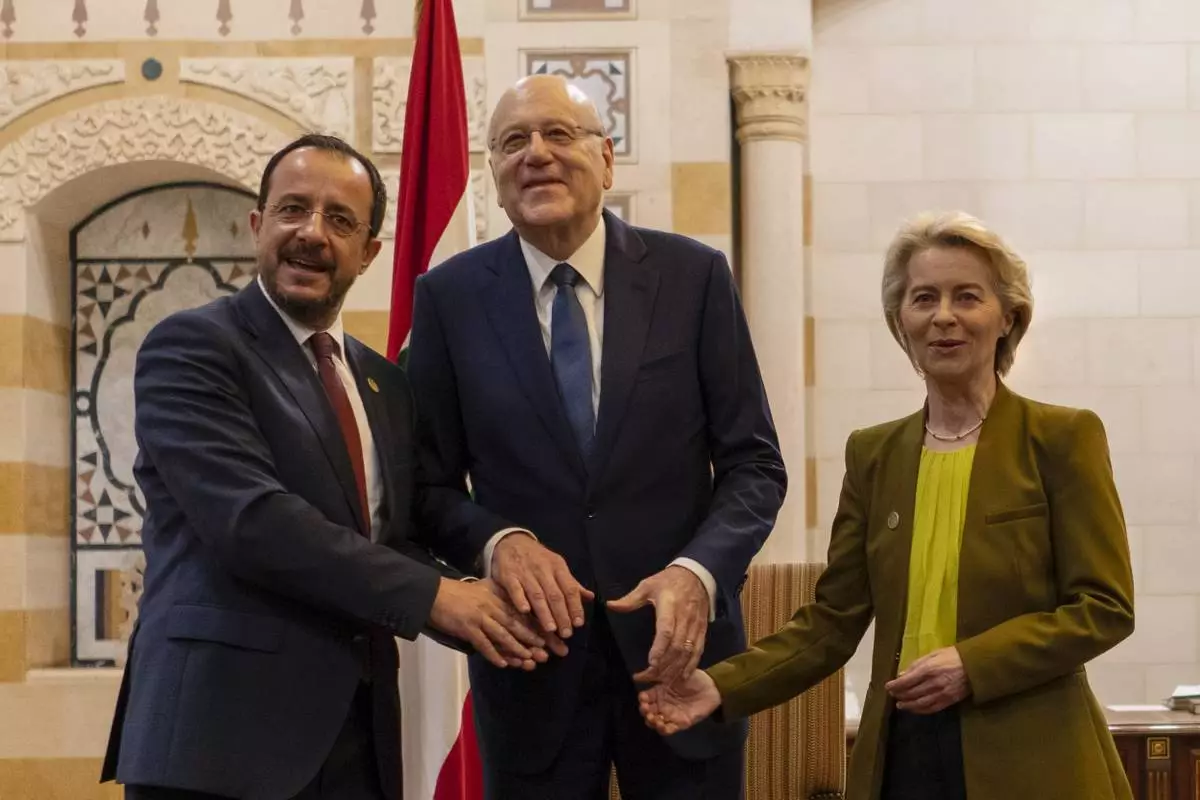
Lebanese caretaker Prime Minister Najib Mikati, center, Cyprus' President Nikos Christodoulides, left, and President of the European Commission Ursula von der Leyen pose for photograph at the government palace in Beirut, Lebanon, Thursday, May 2, 2024. (AP Photo/Hassan Ammar)
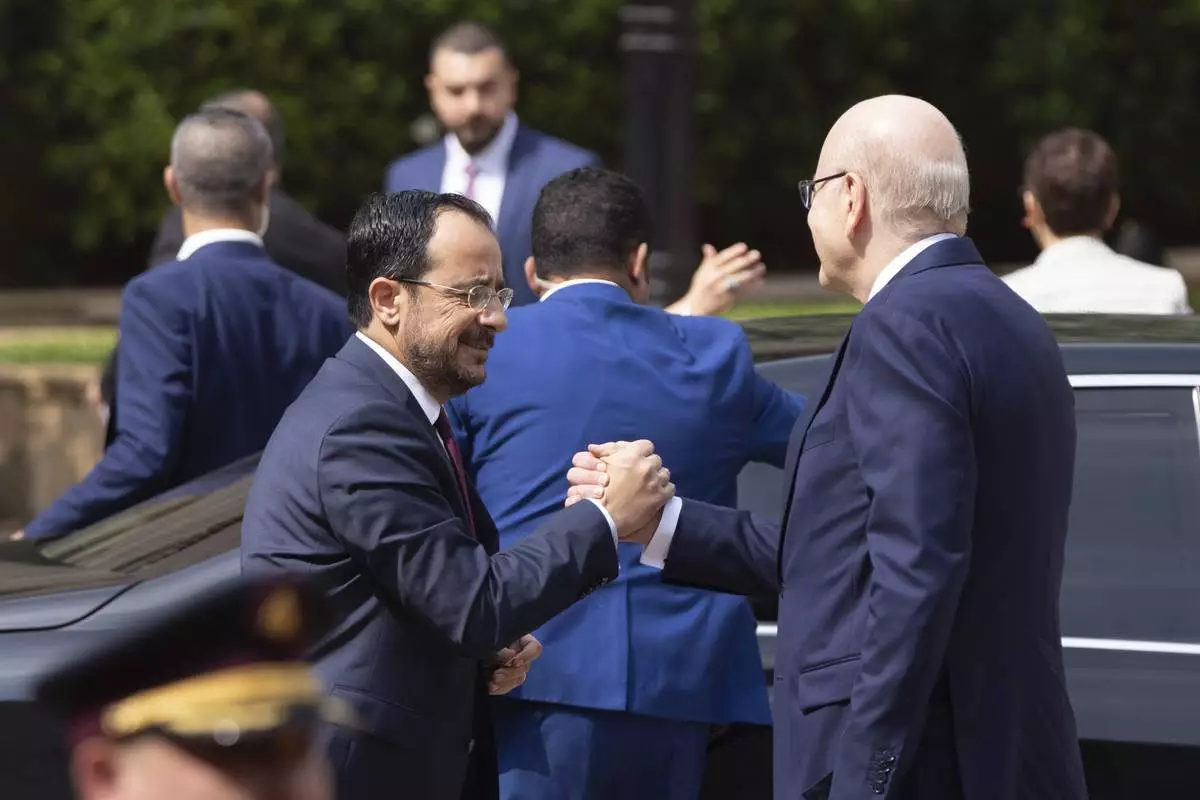
Lebanese caretaker Prime Minister Najib Mikati, right, welcomes Cyprus' president Nikos Christodoulides before their meeting at the government palace in Beirut, Lebanon, Thursday, May 2, 2024. (AP Photo/Hassan Ammar)

Cyprus' President Nikos Christodoulides, left, and President of the European Commission Ursula von der Leyen, center, review an honor guard upon their arrival to meet with the Lebanese Speaker Nabih Berri, in Beirut, Thursday, May 2, 2024. (AP Photo/Hussein Malla)

Lebanese caretaker Prime Minister Najib Mikati, center, speaks during his meeting with Cyprus' President Nikos Christodoulides, left, and President of the European Commission Ursula von der Leyen at the government palace in Beirut, Lebanon, Thursday, May 2, 2024. (AP Photo/Hassan Ammar)
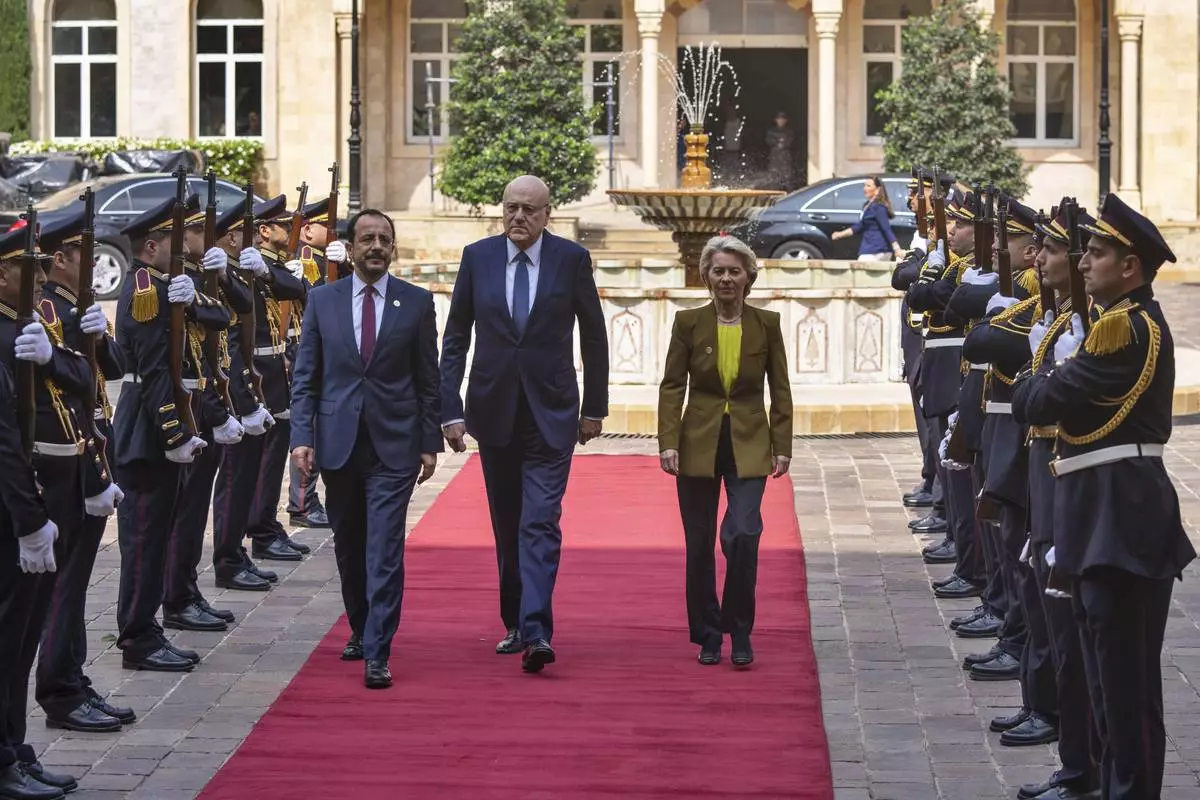
Lebanese caretaker Prime Minister Najib Mikati, center, welcomes Cyprus' President Nikos Christodoulides, left, and President of the European Commission Ursula von der Leyen at the government palace in Beirut, Lebanon, Thursday, May 2, 2024. (AP Photo/Hassan Ammar)












